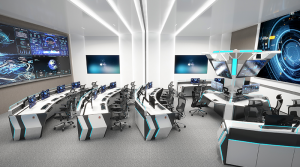Control Room Revolution: Designing and Applying Modern control room furniture
As technology evolves and industries progress, control rooms have become indispensable across various sectors. They oversee monitoring, management, and decision-making in factories, energy facilities, transportation systems, and medical institutions. The design and application of modern control consoles are pivotal in enhancing efficiency, reducing errors, and improving safety.
Background of the Control Room Revolution
In the past, control rooms relied on bulky, single-function consoles. Operators had to switch between different screens and control panels, leading to inefficiency and errors. However, with digital and information technologies advancing rapidly, modern control rooms have transformed. Modern control consoles integrate various functions and feature intuitive interfaces, enabling more efficient operations.
Design Principles and Key Features
Modern control console design emphasizes several principles and features:
Human-Machine Interaction Design:
Consoles conform to ergonomics, ensuring operator comfort during long hours. Interfaces are intuitive, with simple operations to reduce errors.
Information Integration and Visualization:
Consoles integrate various data sources, presented visually for quick and accurate decision-making.
Flexibility and Customizability:
Consoles offer flexible layouts and customizable functions to adapt to different scenarios and workflows, enhancing efficiency.
Intelligence and Automation:
With intelligent algorithms and automation, consoles can autonomously handle operations, improving system stability and safety.
Application Cases and Effect Analysis
Modern control consoles have been widely applied in various industries, achieving significant effects:
Industrial Automation:
Consoles monitor equipment in real-time, identifying and handling abnormalities, improving production efficiency and quality.
Transportation:
In transportation systems, consoles monitor vehicle operations, dispatch routes, and ensure safety and efficiency.
Healthcare:
Control Room Furniture integrate medical devices and systems, offering patient monitoring, diagnosis, and treatment functions, enhancing medical service levels.
Future Prospects and Challenges
As technology like artificial intelligence, the Internet of Things, and big data advances, modern control consoles will continue to evolve. They may achieve higher levels of autonomy and intelligence, reducing human intervention and enhancing adaptability. However, increasing complexity and connectivity pose challenges to security and privacy protection.
In conclusion, modern control consoles drive industry development, improving efficiency and safety. As technology evolves, the control room revolution will continue, bolstering human society’s progress.
